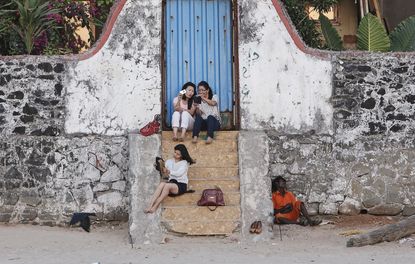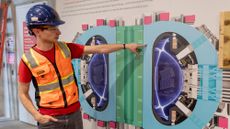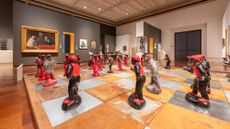The whimsical joy of traveling without technology
Put down your smartphone. Get lost. Be spontaneous. Grow.


A woman dancing in a cage.
We'd asked the cabbie to take us to a dance club, and this is where we'd ended up. An empty, black-lit warehouse, with a woman in a giant metal bird cage hanging from the ceiling.
Apparently "dance club" meant very different things to cab drivers in Mombasa, Kenya, and 19-year-old Americans.
Subscribe to The Week
Escape your echo chamber. Get the facts behind the news, plus analysis from multiple perspectives.

Sign up for The Week's Free Newsletters
From our morning news briefing to a weekly Good News Newsletter, get the best of The Week delivered directly to your inbox.
From our morning news briefing to a weekly Good News Newsletter, get the best of The Week delivered directly to your inbox.
Although wary at first, we laughed and drank our way through a riotous evening, even befriending the woman who was suspended above us. We had the dance floor to ourselves, and left with a story we're still telling 11 years later.
Today, this never would've happened. Because rather than letting the night (and okay, the cabbie) take us where it wanted, we would've whipped out our smartphones and let Google decide instead.
You don't have to go far to see the perilous effects of technology on human behavior. It's at the table next to you, where a couple on a date is scrolling through their Twitter feeds instead of speaking. It's on the street, barreling toward you in the form of an oblivious text-walker.
But this problem is even more pronounced when you're traveling.
It's not just that we stare at our phones over a meal — it's that we let technology curate that meal. It's the pressure we feel to find the "perfect" restaurant with the best reviews, rather than stumbling across a hole-in-the-wall with phenomenal tacos. It's visiting locations simply because they're "Instagrammable." It's the loss of the ability to actually get lost. The fear of being lonely or uncomfortable; of experiencing the very emotions that help us grow.
When I first started traveling in 2003, smartphones were not a thing. And cell phones were barely a thing. If you wanted to use the internet, you waited in line at an internet cafe to type on some infernal foreign keyboard with letters in all the wrong places. And then, after ploddingly sending an email to your parents to let them know you were alive, you returned to your hostel, where you sat in the common room and drank beers and compared stories and thought about kissing that boy with the long hair and then went out together and ended up kissing that boy with the long hair.
Nobody looked at their phones. Nobody looked through Tinder because they could maybe, possibly find a cuter boy with even longer hair. Nobody Googled the "top 10 clubs"; you wandered the streets and stopped at the first place that looked interesting. Sometimes it sucked — but because you didn't have to post the evening's events for judgment by your social media followers, you usually made your own fun, even if it sucked.
During the days, you explored, relying on the indecipherable free map from the tourist office to figure out where you were going. You inevitably got lost. And when you did, you asked a stranger for help. Maybe he was brusque — or maybe he invited you to try his wife's famous eggplant parmesan.
These days? That spontaneity is gone.
The abundance of information, of choice, has us terrified of making the wrong decision, of choosing the restaurant with the slightly inferior noodles, the hotel with the less-than-perfect view, or the route that takes a few minutes longer.
We're so afraid of being alone that, when sitting at a cafe, we log onto Facebook to scrutinize the lives of 2-D people rather than witness what's happening around us.
But here's the truth: Most of the time, travel isn't Instagrammable. It's messy, frustrating and, sometimes, downright hard. Those moments might not be pretty, but they do help us grow, and that's what makes travel so valuable.
It's during the the lonely times you learn to appreciate all the people back home. It's when you miss a bus and wait for hours that you develop patience. And it's the unexpected or hard days — not the perfect ones — that make the best stories.
In 2007, my boyfriend and I got lost while hiking in Corsica. We found ourselves in a pasture, getting chased by several growling sheep dogs. It was scary at the time, but hilarious, even exhilarating afterwards. We laughed about it for years.
Had we had smartphones to guide us, we never would've gotten lost in the first place. We never would've had that memory. Or those laughs.
Of course, technology undoubtedly makes travel safer — and I'm not trying to romanticize dangerous situations. Being able to call for help, translate your medical needs, or find your way out of a sketchy neighborhood make technology indispensable.
But what if we only used it when we really needed it? What if technology became a tool, rather than a crutch? Could we get some of that spontaneity, that thrill of discovery, back?
I say yes. One of my favorite suggestions is from Chris Guillebeau, an entrepreneur and author who's visited every country in the world.
"Even in exotic locales, I often find myself tethered to my phone, not looking up to see what I'd spent considerable money and effort to come for," he says. "So I've started taking long walks with no technology. In fact, all I take is my notebook, some taxi money, and a business card from my hotel in case I get lost. I always come back feeling refreshed."
No tech, no destination. Just exploration.
Another idea? Travel slowly. Stay in one place, rather than rushing to several different destinations. With the luxury of time comes the luxury to make mistakes. To get lost, to eat at a place with subpar food, to not set an agenda.
"I've left Yelp behind," adds Jodi Ettenberg, the food and travel writer behind Legal Nomads. "Instead, I roam morning markets, and when I find a stall I enjoy, I ask where to find that dish around town. A fun and more connective way to explore through tastebuds."
Leah Davis, a travel blogger and freelance writer, suggests leaving your camera at the hotel for the day. "Rather than focusing on getting the perfect shot, try writing down what you see or experience in a journal, or even creating sketches," she says. "You'll notice details about your surroundings that you never would've otherwise — and remember it more vividly after the fact."
And when you do take photos, wait to post them until after your trip. Without the pressure to share a killer photo right now, you'll give yourself permission to do what you like — rather than what will get you the most likes.
Travel will never be what it used to be, for better or for worse. But with a pinch of capriciousness and a dash of luddite, we can still find ways to cultivate wonder and adventure — the very feelings that got us hooked on travel in the first place.
Sign up for Today's Best Articles in your inbox
A free daily email with the biggest news stories of the day – and the best features from TheWeek.com
Susan Shain is a freelance writer and digital nomad. She covers travel, food, and personal finance (basically, how to save money so you can travel more and eat more). Formerly the senior writer at The Penny Hoarder, her writing has also appeared in Mashable, Travel+Leisure, and Cosmopolitan. Follow her journey at susanshain.com.
-
 'The disconnect between actual health care and the insurance model is widening'
'The disconnect between actual health care and the insurance model is widening'Instant Opinion Opinion, comment and editorials of the day
By Anya Jaremko-Greenwold, The Week US Published
-
 Cautious optimism surrounds plans for the world's first nuclear fusion power plant
Cautious optimism surrounds plans for the world's first nuclear fusion power plantTalking Point Some in the industry feel that the plant will face many challenges
By Justin Klawans, The Week US Published
-
 Explore new worlds this winter at these 6 enlightening museum exhibitions
Explore new worlds this winter at these 6 enlightening museum exhibitionsThe Week Recommends Discover the estrados of Spain and the connection between art and chess in various African countries
By Catherine Garcia, The Week US Published